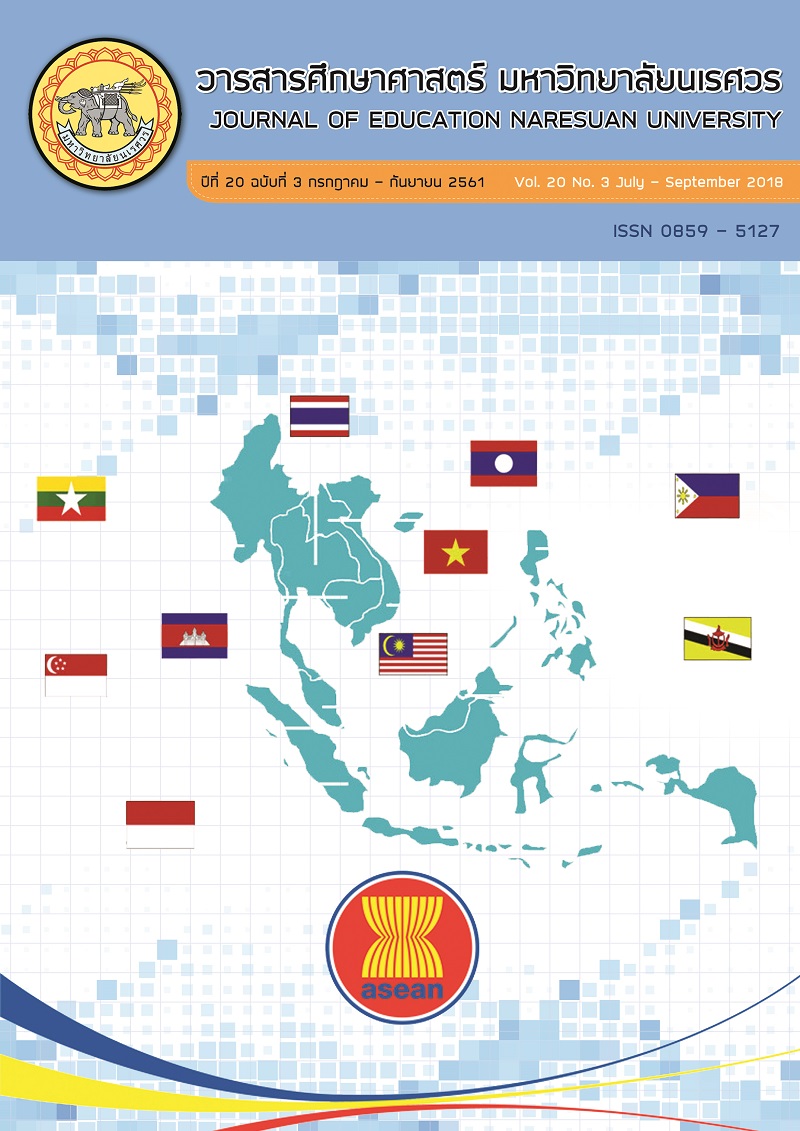การพัฒนาหลักสูตรฝึกอบรมภาษาฝรั่งเศสเพื่อการสื่อสารโดยใช้กระบวนการสุนทรียสาธกร่วมกับการเรียนรู้แบบร่วมมือ สำหรับพนักงานโรงแรม; DEVELOPMENT OF A TRAINING CURRICULUM ON COMMUNICATIVE FRENCH USING APPRECIATIVE INQUIRY ALONG WITH COOPERATIVE LEARNING FOR HOTEL
Main Article Content
Abstract
การวิจัยครั้งนี้มีวัตถุประสงค์เพื่อพัฒนาหลักสูตรฝึกอบรมภาษาฝรั่งเศสเพื่อการสื่อสาร โดยใช้กระบวนการสุนทรียสาธกร่วมกับการเรียนรู้แบบร่วมมือ สำหรับพนักงานโรงแรม ดำเนินการวิจัยโดยใช้กระบวนการวิจัยและพัฒนา 4 ขั้นตอน ดังนี้ 1) ศึกษาข้อมูลที่จำเป็นในการพัฒนาหลักสูตรฝึกอบรม จากพนักงานต้อนรับ จำนวน 12 คน ผู้จัดการแผนกต้อนรับ จำนวน 3 คน ลูกค้าที่ใช้ภาษาฝรั่งเศส จำนวน 3 คน และผู้เชี่ยวชาญด้านกระบวนการสุนทรียสาธก จำนวน 1 คน โดยใช้แบบสัมภาษณ์ 2) สร้างและหาคุณภาพของหลักสูตรฝึกอบรม เครื่องมือที่ใช้คือ หลักสูตรฝึกอบรม เอกสารประกอบหลักสูตรฝึกอบรม และแบบประเมินความเหมาะสมของหลักสูตรฝึกอบรมและเอกสารประกอบหลักสูตรฝึกอบรม โดยตรวจสอบความเหมาะสมของหลักสูตร จากผู้เชี่ยวชาญจำนวน 3 คน 3) ทดลองใช้หลักสูตรฝึกอบรม แหล่งข้อมูลคือ พนักงานต้อนรับ โรงแรมไอยรา แกรนด์พาเลซ อำเภอเมือง จังหวัดพิษณุโลก จำนวน 6 คน ที่สมัครเข้าร่วมโครงการ โดย 3.1) ศึกษาผลการใช้หลักสูตรฝึกอบรมภาษาฝรั่งเศสเพื่อการสื่อสารระหว่างการฝึกอบรม โดยใช้แบบประเมินความสามารถในการสื่อสารภาษาฝรั่งเศสระหว่างการฝึกอบรม แบบบันทึกข้อมูลภาคสนาม และแบบบันทึกการค้นหาศักยภาพด้านบวกของตัวเอง 3.2) เปรียบเทียบความสามารถในการสื่อสารภาษาฝรั่งเศสหลังการฝึกอบรมกับเกณฑ์ ร้อยละ 60 โดยใช้แบบประเมินความสามารถในการสื่อสารภาษาฝรั่งเศสหลังการฝึกอบรม 4) ศึกษาความพึงพอใจที่มีต่อการอบรมด้วยหลักสูตรฝึกอบรม หลังเสร็จสิ้นกิจกรรมฝึกอบรม โดยใช้แบบประเมินความพึงพอใจ สถิติที่ใช้ในการวิเคราะห์ข้อมูล คือ ค่าเฉลี่ย ค่าเบี่ยงเบนมาตรฐาน และการทดสอบค่าที (t-test) ผลการวิจัย พบว่า 1) บุคคลที่เกี่ยวข้องกับงานโรงแรม และผู้เชี่ยวชาญด้านกระบวนการสุนทรียสาธก มีความต้องการให้จัดทำหลักสูตรฝึกอบรมภาษาฝรั่งเศสเพื่อการสื่อสาร โดยเนื้อหาที่ต้องการฝึกอบรม ได้แก่
บทสนทนาที่ใช้ในการพูดคุยกับลูกค้า ภาษาฝรั่งเศสเบื้องต้น และอุปกรณ์เครื่องใช้ภายในโรงแรม และระยะเวลาในการฝึกอบรมขึ้นอยู่กับความเหมาะสมของเนื้อหา 2) หลักสูตรฝึกอบรม มีคุณภาพอยู่ในระดับมากที่สุด (= 4.62, S.D. = 0.49) และเอกสารประกอบหลักสูตรฝึกอบรม คือ คู่มือสำหรับผู้ให้การฝึกอบรมมีคุณภาพโดยรวมอยู่ในระดับมาก (
= 4.49, S.D. = 0.50) และคู่มือสำหรับผู้เข้ารับการฝึกอบรมมีคุณภาพโดยรวมอยู่ในระดับมาก (
= 4.39, S.D. = 0.50) 3) ผลการทดลองใช้หลักสูตรฝึกอบรม พบว่า 3.1) ระหว่างการฝึกอบรมผู้เข้ารับการฝึกอบรมมีความสามารถในการสื่อสารภาษาฝรั่งเศสเพิ่มขึ้นทุกคน 3.2) ความสามารถในการสื่อสารภาษาฝรั่งเศสของผู้เข้ารับการฝึกอบรมหลังการฝึกอบรมสูงกว่าเกณฑ์ร้อยละ 60 อย่างมีนัยสำคัญทางสถิติที่ระดับ .05 และ 4) ความพึงพอใจที่มีต่อการอบรมด้วยหลักสูตรฝึกอบรม หลังเสร็จสิ้นกิจกรรม โดยรวมอยู่ในระดับมากที่สุด
DEVELOPMENT OF A TRAINING CURRICULUM ON COMMUNICATIVE FRENCH USING APPRECIATIVE INQUIRY ALONGWITH COOPERATIVE LEARNING FOR HOTEL EMPLOYEES
The purposes of this study were to develop a training curriculum on communicative French using Appreciative Inquiry along with Co-operative learning for hotel employees. The research and development procedure comprised four steps: 1) To study need assessment to develop a training curriculum by carrying out interviews with eleven receptionists, three front office managers, three French speakers and an Appreciative Inquiry expert. 2) To construct and identify efficiency of the training curriculum by three experts to examine the appropriateness. 3) To experiment was carried out with six receptionists from Ayara Grand Palace Hotel, Phitsanulok as follows: 3.1) to study their training achievement during the training period using ability evaluation, field notes and positive discovery notes, and 3.2) to compare their training achievement after the training period with criterion percentage of 60, using ability evaluation. 4) To study the satisfaction of the hotel employees towards the training curriculum using satisfaction evaluation. The data were analyzed using the Mean, the Standard Deviation and t-test (One Sample test). The results of this study were 1) people in groups wanted to get the training curriculum on communicative French. The content included basic communication with clients, basic French and vocabulary relevant to the hotel and the hotel situation. The schedule is appropriate to the contents of the curriculum. 2) The quality of the training curriculum was considered at very good level (= 4.62, S.D. = 0.49). The mean score for the trainer manual was assessed at good level (
= 4.49, S.D. = 0.50). The trainee manual was assessed at good level (
= 4.39, S.D. = 0.50). 3) The outcome of using the training curriculum was as follows: 3.1) the receptionists reported that their ability to use communicative French in social interaction passed their stated goals, and 3.2) they reported that their communicative French ability after training was higher than the stated criterion at .05. 4) The satisfaction of the hotel employees indicated a high level.
Article Details
The owner of the article does not copy or violate any of its copyright. If any copyright infringement occurs or prosecution, in any case, the Editorial Board is not involved in all the rights to the owner of the article to be performed.
References
Bangmo, S. (2008). Techniques in training and conference (4th ed.). Bangkok: Wittayapat. (in Thai)
Bhumiratana, C. (2013). Policy of teaching western language and role of French language in Thailand’s educational systems. Research Academic “Thailand and Policy of foreign language: the important of French language in the world stage”. Bangkok: Kasetsart University. (in Thai)
Cockell, J., & Mc Arthur-Blair, J. (2012). Appreciative Inquiry in higher education: A transformative Force. USA: John Wiley & Sons.
Darnsawasdi, D., & Handumrong, N. (2012). Lodging and hotel entrepreneurs in Phra NaKhon and Dusit Districts and French communicative competency (research report). Bangkok: Suan Sunandha Rajabhat University. (in Thai)
Department of Academic. (1998). The manual of teaching English at primary level. Bangkok: Development curriculum Center. (in Thai)
Department of Tourism. (2015). Tourists statistics. Retrieved July 7, 2015, from http://newdot2.samartmultimedia.com/home/listcontent/11/221/276 (in Thai)
Gilliam, Janice Hoots. (2002). The impact of cooperative learning and course learning environment factors on learning outcomes and overall excellence in the community college classroom (Doctoral dissertation). Raleigh, North Carolina: North Carolina State University.
Jaitieng, A. (2010). Teaching principle (5th ed.). Bangkok: Odien Store. (in Thai)
Koson, C., Wattanatorn, A., Keawurai, W., & Onthanee, A. (2013). Training curriculum development with knowledge management for teachers of English on the competence of constructing local youth-guide curriculum. Journal of Education Naresuan University, 15(4), 33-44. (in Thai)
Lowimongkol, R. (2008). Problems and satisfaction of French tourists during their stay in hotels in Thailand. Chiang Mai University, Journal of Social Sciences and Humanities, 11(2), 1-24. (in Thai)
Naksawat, T. (2007). Instructional packages on “communicative French for tourism using video aided instruction for hotel receptionists and tourism business in Phitsanulok” (research report). Bangkok: Office of the Higher Education Commission. (in Thai)
Prachai, U. (2011). The development of communicative English training course for medical personnel at Khonkaen Ram Hospital in Khon Kaen Province (Independent Study). Khon Kaen: Khon Kaen University. (in Thai)
Rattanaphan, P. (2013). Applied the Appreciative Inquiry on routine research and institutions research. KU, Journal of research, 1 (2), 191-194. (in Thai)
Saiyod, L., & Saiyod, A. (1995). Techniques in educational research (4th ed.). Bangkok: Suweeriyasan. (in Thai)
Smithikrai, Ch. (2013). Personnel training in the organization (8th ed.). Bangkok: Chulalongkorn University. (in Thai)
Tumtong, B. (2010). Curriculum development. Bangkok: Chulalongkorn University. (in Thai)
Wattanawong, S. (2014). Psychology of adult training (2nd ed.). Bangkok: Chulalongkorn University. (in Thai)
Whitney, D., & Trosten, A. (2001). The liberation of power: Exploring how appreciative inquiry “powers up the people”. Organization Development Journal, 13(3), 14-22.


